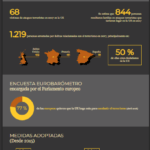The Commission is reporting on progress made towards an effective and genuine Security Union. Thanks to close cooperation between the European Parliament, the Council and the Commission, the EU has taken significant strides in this work, putting in place a number of priority legislative initiatives and implementing a wide range of non-legislative measures to support its Member States and enhance security for all citizens.
Building on that, the report identifies areas where further work is needed to address immediate security threats. In particular, with the new European Parliament now in place, co-legislators should swiftly start negotiations on the Commission’s proposal to take terrorist content off the web. Member States should also ensure the implementation of agreed new security rules as a matter of priority.
Report findings
Following the horrific attack in Christchurch, New Zealand, this report reiterates the urgent need to tackle terrorist content online and radicalisation. It also recaps actions taken to build the EU’s resilience against cyber threats, enhance security of digital infrastructures and strengthen the anti-money laundering framework. This comes in addition to the Commission’s efforts to ensure full implementation of EU security laws by all Member States. The report highlights the following areas in need of action:
- Countering terrorist propaganda online: Following up on commitments made in the context of the ‘Christchurch Call for Action‘, the Commission together with Europol initiated work on the development of an EU crisis protocol with the aim of finalising it by October 2019. The Commission calls on the European Parliament and the Council to resume and finalise work on the proposed rules to remove terrorist content from the internet as a matter of urgency.
- Boosting cybersecurity: The EU has made important progress in tackling cyber threats, however, a number of key proposals are still pending in the European Parliament and the Council. This includes a European Cybersecurity Competence Centre and a Network of National Coordination Centres as well as cross-border access to electronic evidence. In all cases, the Commission calls for swift agreement by the European Parliament and the Council.
- Strengthening digital infrastructures: Following the Commission’s Recommendation on cybersecurity of 5G networks in March this year, EU Member States have now submitted national risk assessments. Based on the input gathered, Member States, together with the Commission and the EU Agency for Cybersecurity (ENISA) will complete an EU-wide risk assessment of 5G network infrastructures by October 2019 and will then identify a set of mitigating measures by December 2019.
- Reinforcing anti-money laundering framework: The Commission also adopted a package of 4 reports that will support European and national authorities in better addressing money laundering and terrorist financing risks.
The work on completing the Security Union is supported by the EU’s actions at international level including via the UN as well as through strategic relationships with the U.S and Western Balkans. In addition, the EU has concluded negotiations on the EU-Canada PNR Agreement with a view to finalising the Agreement as soon as possible, and will soon begin joint evaluations of its existing PNR Agreements with Australia and the United States.
More information
Access the complete news
Related news: Security Union: Commission receives mandate to start negotiating international rules for obtaining electronic evidence
Related factsheet: Security Union: A Europe that protects: towards a more united, stronger and more democratic union






Leave a Reply